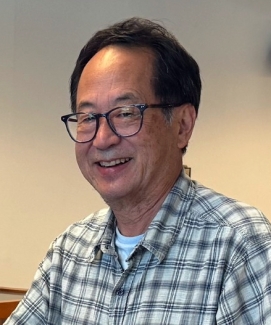Alumni Spotlight
Mark Terasaki has been part of the MBL community for nearly four decades, first arriving as a postdoc in 1986. His reflections capture both the scientific spirit of Woods Hole and the personal connections that make MBL a truly special place.
I first came to MBL in 1986 to work as a post-doc in the lab of Tom Reese, a neurobiologist and staff scientist at the National Institutes of Health. At that time, Tom’s NIH lab was year-round at MBL. There was nice afterglow in his lab from the discovery of kinesin, and cyclin had been discovered by others at MBL a few years earlier.
After I spent two winters in Woods Hole, the Reese lab was pulled back to NIH, and I spent just the summers at MBL. In 1995, I got my own lab at the University of Connecticut Health Center to be with cell biologist Rindy Jaffe, who I had met at Woods Hole. Tom Reese generously let me continue working in his space during the summers.
I was a faculty member in the MBL Neurobiology course from 1994 to 2007. I have been renting a summer lab at MBL since 2010 and bought a house in the area. In all, I have been coming to MBL for 40 consecutive summers. My research is concerned with cell organization as studied by light and electron microscopy.
What makes the MBL special? Very briefly, many important scientific discoveries have been made there, and the educational program is world class. It helps that it is right on the ocean. But there is also something remarkable about the scientific atmosphere there during the summer. I recently found an article that conveys something of this. This is from an obituary of Otto Loewi, a Nobel Prize winner who had to flee Germany during World War II. It was written by Stephen Kuffler, an inspirational figure in neurobiology himself.
"One cannot write about Otto Loewi without mentioning his special relationship with the Marine Biological Laboratory at Woods Hole, Mass., where he spent his summers, including the last one in 1961. There he was truly at home and in his element. He felt happy surrounded by an eager crowd of young and older scientists from all over the world and loved the ferment and turmoil that accompanies the informed, lively, and critical exchange of ideas. With youthful enthusiasm he struggled to keep up to date with scientific advances. With a sure instinct he recognized valuable new developments. He was happy to see the richness and intensity of scientific life in Woods Hole spill over into other spheres of activity. For him science was one of the creative arts and not to be kept separate. His interest and sympathetic help was quickly aroused when he perceived originality in any of its forms and his advice was sought by many. He had no ready answers and would spend hours discussing problems, especially with young people."
To me, at least, this article gets across that the MBL is a place where science / biology is studied for its own sake and which attracts people with a love of learning. For sure, not everything is sweetness and light, but it is a place where wonderful interactions and insights occur. It is reassuring to me that the MBL that this old article describes is still recognizable today.
The large donation I am making to MBL is due to my father, Paul I. Terasaki. He worked at UCLA and was a major figure in making human transplantation possible through his discoveries about transplant rejection. He was energetic, creative, and good at managing people. In 1985, when he was 55, he started the company One Lambda with 8 people from his lab. It succeeded beyond anyone's expectations and became the leading company in transplant diagnostics. The company was sold in 2011. He passed away in 2016, and my mother in 2024. The donation to the MBL is part of his legacy.
